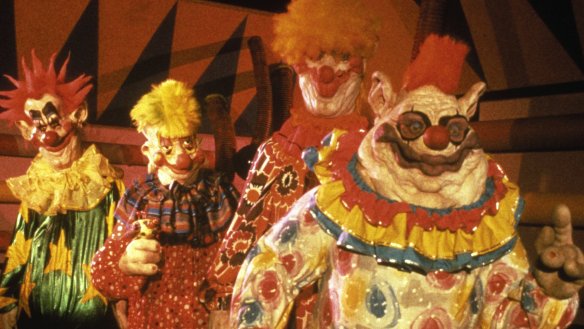Hello folks, and welcome back to Wrong Every Time. Today we’ve hit the first week of the summer anime season, which of course means we’re in truth a third of the way through summer, because the year actually starts a month into winter and nothing truly means anything. Regardless, this occasion marks the perfect time to take a glance at the contenders of last season, whose glimmering early potential has at this point solidified into cold, uncompromising reality. It seems folks aren’t so hot on Shinichiro Watanabe’s latest, but I’m looking forward to checking out our latest Gundam, and have been hearing nothing but positive things about Apocalypse Hotel. Clearly more investigation will be needed, but for now, let’s run down our latest film contenders in the Week in Review!
Having drunk deeply of Tubi’s collection of quasi-professional horror features, I decided it was past time to check one of the ‘80s last iconic horror excesses off my list, and thus screened Killer Klowns From Outer Space. The film offers pretty much precisely what you’d expect: a small town under attack by extraterrestrial clown monsters, who employ popcorn guns and carnivorous shadow puppets to capture humans in cotton candy and drink them down with swizzle straws. With their town under siege and the sheriff writing it all off as a prank, the three youngsters Dave, Mike, and Debbie (the most ‘80s name) must band together to defeat this red-nosed invasion.
Based on its reputation, I didn’t really expect much from Killer Klowns – considering its joke of a concept, I expected it to be a similarly tossed off film, perhaps only enjoyable in a “so bad it’s good” sort of way. Turns out I was mercifully mistaken – Killer Klowns commits to its premise with creativity and determination, offering a horror comedy spectacle that sits comfortably alongside similar ‘80s features like Gremlins and The Stuff.
The film’s primary, proudest achievement is its delightfully horrifying clown costumes. The Killer Klowns are an admirable collection of monstrosities; each painted face is distorted and stretched in some uniquely unsettling direction, each pair of beady eyes and piranha teeth promise their own malevolent intentions. These clowns are complemented by generous set design and lovingly constructed prop weapons, all of which serve to sell the clowns’ preposterous menace by force of inventive commitment.
Clowns hunt down victims with balloon animal tracker hounds, face off with biker gangs atop miniature tricycles, and dazzle onlookers with all manner of traditional clownery, before promptly whipping out their ray guns and candifying their victims with sadistic glee. Though the slasher connective tissue linking these clown setpieces is all pretty routine, Killer Klowns’ delight in hypothesizing uniquely clown-themed methods of trickery and mayhem keeps things novel and engaging throughout. Whether you’re big into clowns or just an appreciator of dedicated practical effects, Killer Klowns definitely earns a spot within the 80s horror comedy pantheon.
We then screened The Way of the Dragon, a feature directed by and starring the incomparable Bruce Lee. Sent from Hong Kong to Rome in order to protect a family restaurant from some local thugs, Lee proceeds to put the fear of god in every opponent he comes across, prompting a series of escalations and counter-escalations that eventually see his enemies calling in Chuck fucking Norris to beat his ass, in a colosseum-set duel that counts among the greatest ever filmed.
And… that pretty much covers it. Honestly, if you haven’t actually seen a Bruce Lee feature, there’s little language I could use to describe his abilities that would properly quantify them relative to his fellow martial arts stars. The man is coiled lightning, his fists snapping like vipers, his eyes promising horrible retribution with every furrow of the brow. His fights reveal the inherent poetry of the human body in its most refined, confident expression; and as gifted he is as a martial artist, he is additionally blessed with that indefinable star power, the ability to demand the camera’s adoration with the slightest shift in expression.
As a narrative, The Way of the Dragon is both slight and unwieldy, offering a bare-bones story and still managing to convolute itself through the vague relations of its variable antagonists. But basically none of that matters; when Bruce Lee is placed in front of some baddies he must dismantle, everything fades but the harrowing steel of his blows and the swirling grace of his forms. It is an eternal shame that Lee died so young, but the films he left behind serve as an enduring testament to the beauty of martial arts.
We then attempted to sate our perpetual hunger for human flesh with Deep Fear, a recent shark-centric thriller starring Madalena Ghenea as Naomi, an accomplished rescue diver who ends up biting off a bit more than she can chew. Held hostage by cocaine smugglers, she is forced to dive into their wrecked boat in order to retrieve their cargo while hungry sharks patrol the waters above.
It’s honestly a fair enough gimmick for facilitating repeated shark attacks, but Deep Fear mostly uses it to alleviate the film’s lack of actual teeth (alright, I’ll stop), attempting to mitigate its paucity of horror setpieces with a dollop of thriller energy. The results are altogether disappointing, and it seems clear enough that Ghenea should probably stick to modeling. I will give some points for villain Macarena Gomez though, who uses her distinctive eyes to project such an intense loathing of humanity that I was convinced of her villainy pretty much before she said anything. Unusual faces are a powerful currency in film, and Gomez knows just how to use hers.
Last up for the week was We Have A Ghost, a recent horror-comedy about a family that moves into an abandoned house, only to soon discover they’re sharing the residence with an attic ghost. Jahi Winston stars as the young son who first befriends “Earnest” (David Harbour), who his father (Anthony Mackie) swiftly conscripts into a variety of get-rich-quick viral schemes. Also along for the ride are Jennifer Coolidge as a daytime TV host and Tig Notaro as a paranormal specialist, rounding out this altogether excellent leading cast.
Unfortunately, We Have A Ghost doesn’t seem quite sure what to do with all that talent. The film is somewhat formless and lacking in strong gags; there are individual scenes with a reasonable hit rate, but I would overall describe the film as “mostly pleasant and occasionally shrill,” a film that only comes alive in the relationship between Winston and Harbour. Harbour in particular really proves himself here, demonstrating through Earnest’s wordless performance that he has absolutely earned his status as Stranger Things’ breakout star. A little more time spent cooking on the parallels of Winston and Harbour’s characters would have done this film a world of good; as-is, it’s perfectly watchable, but sadly not worth an active recommendation.




